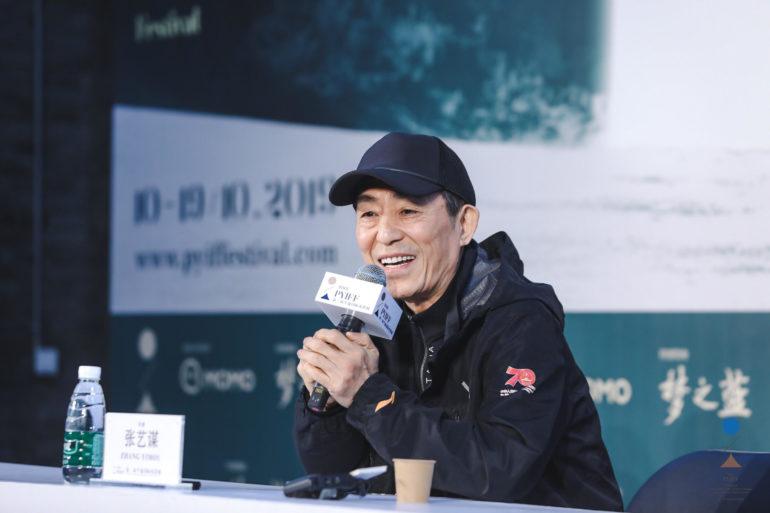Zhang Yimou Talks ‘One Second,’ New Projects and Directing Nationalist Propaganda Shows
By Rebecca Davis
LOS ANGELES (Variety.com) – Fresh off directing the enormous spectacle of China’s 70th anniversary gala earlier this month, Chinese filmmaker Zhang Yimou took to the much smaller stage of the Pingyao International Film Festival on Friday to discuss his involvement in such propaganda displays as well as his upcoming works.
Since last year’s “Shadow,” Zhang has been at work on three different features, two of which are completed and one currently in prep.
The Cultural Revolution-era “One Second,” his self-professed “love letter to cinema,” made headlines in February when it was abruptly withdrawn from the Berlin Film Festival by touchy Chinese censors likely concerned about its portrayal of that period of history. It hasn’t been heard from since.
Asked about the movie’s fate, Zhang said: “I’m still not sure. I hope it can be seen by everyone as soon as possible.” He repeated the sentiment at a masterclass Friday morning entitled “Every Second Counts,” which seems to hint at the possibility of a theatrical release in the near future.
A new film, Zhang’s first gangster-themed work, is called “Rock Solid.” It has already finished shooting and post-production and was just sent to censors for approval this week following China’s long National Day holiday. “It’s what I’m calling ‘hardcore gangster’ — it’s very urban, with a very grave and stern realistic style, and the visuals are very unique,” he said.
A third film, a wartime spy feature, will begin shooting at the end of the year in the midst of the harsh winter of northeast China.
“Just as with ‘Shadow,’ the aesthetics are going to be very unique. It’s endlessly snowing, constantly snowing. I hope that it’ll evoke the atmosphere of a world of snow and ice in a way that will rouse people’s emotions and creates a sense of daggers-drawn suspense,” he said. “When people are in a very different environment and context, human nature will change entirely and generate totally different types of reactions and responses. This constant flux when you’re telling people’s stories is what attracts me most to filmmaking.”
He said that while he’d love to direct a sci-fi film, he had yet to encounter a script that really spoke to him, saying, “It is increasingly rare these days to find stories that touch your heart as a director.”
In between his busy shooting schedule, Zhang makes time to direct large-scale government-run events involving thousands of participants, beginning with the 2008 Beijing Olympics opening ceremony. In the midst of post-production on “Rock Solid,” he spent six months overseeing rehearsals for the 60,000 person-strong patriotic performance in Tiananmen Square on Oct. 1 that capped a vast military parade.
The centerpiece was a sea of men in bedazzled jumpsuits holding light-up panels in different formations, such as the characters for “long live the motherland,” as fireworks blasted overhead.
On Friday, Zhang wore a jacket with the 70th anniversary event’s logo on the sleeve and a Chinese flag over his heart. “I feel I have an unshirkable duty towards [such events]. Whenever I have time between shoots, I do my best to throw myself into them. It’s also a way for me to train myself and improve my own capabilities.”
He waxed poetic about the special feeling of being on one of the world’s largest plazas – where 30 years ago the tanks rolled in to crush pro-democracy protests – during evening rehearsals, with the normally congested surrounding streets closed to traffic.
“When several tens of thousands of people are singing together at the top of their lungs before the Tiananmen gate, you feel their clamor, and even if it’s a very familiar song, you come to know and appreciate it in a new way that’s very different. It’s rare to have an opportunity like that in life, and it left a deep impression on me, seeing the young people’s passion.”
Zhang’s stance highlights the complicated line that China’s most prominent filmmakers – including the Pingyao festival’s founder, acclaimed director Jia Zhangke – must walk in order to create movies that their fellow Chinese are actually able to see, as self-professed patriots and participants in China’s project of global image-making who nonetheless remain victims of censorship themselves.

